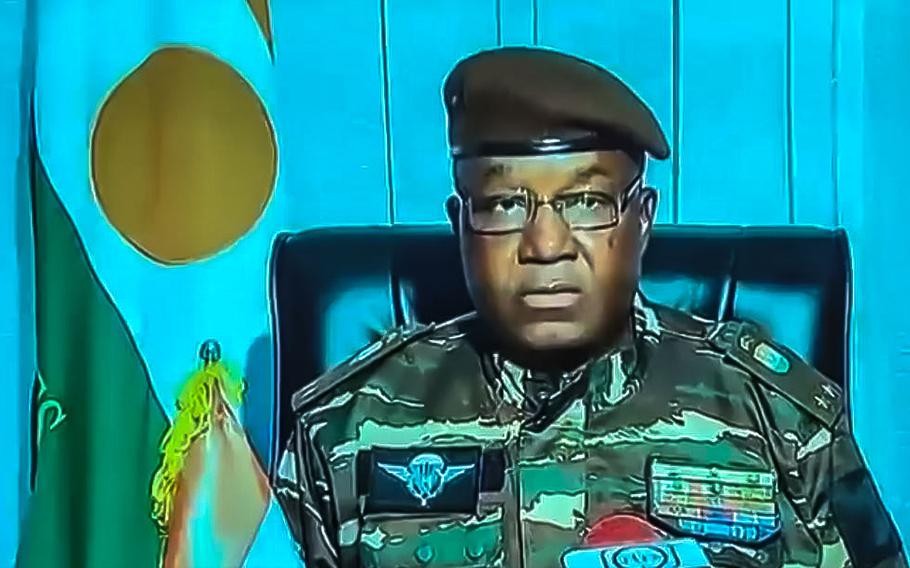
A video screen grab shows Gen. Abdourahmane Tchiani, who announced on Friday, July 28, 2023, that he is the new leader of Niger. (Twitter)
DAKAR, Senegal — Nearly one month after mutinous soldiers mounted a coup in Niger, diplomatic talks to resolve the crisis have made little progress. The elected president, Mohamed Bazoum, remains held captive by soldiers who once protected him. The threat of military intervention by a major West African political bloc looms.
At stake is not only the fate of democracy in Niger but the credibility of the Economic Community of West African States (ECOWAS), the 15-member bloc of West African countries that is at the center of efforts to tackle the impasse and restore constitutional order to Niger. Even as the group continues to pursue a negotiated resolution, ECOWAS has announced that it has decided upon an undisclosed "D-Day" for military intervention in Niger.
The group has drawn a red line in Niger, following previous coups in Mali, Burkina Faso and Guinea that were condemned by ECOWAS but met with markedly less resistance.
When Nigeria's President Bola Ahmed Tinubu was elected chairman of the group last month, he promised in his acceptance speech that the bloc would "not allow coup after coup," saying that although "democracy is very tough to manage, it is the best form of governance." ECOWAS cannot "sit back like a toothless bulldog," he said.
Tinubu's firm stance reflects a variety of factors, including his history as a democratic activist sent into exile under Nigeria's former military regime and his determination to avoid a similar episode in Nigeria, which is Africa's most populous democracy, according to Ebenezer Obadare, the Douglas Dillon senior fellow for Africa studies at the Council on Foreign Relations. After such a strongly worded speech, Obadare added, Tinubu probably "felt compelled to put his money where his mouth is."
The moment marks a milestone for intra-African geopolitics, analysts say. "For ECOWAS, the stakes are huge," said Tatiana Smirnova, a researcher at the Centre FrancoPaix in conflict resolution and peace missions. "To some extent, the situation in Niger will decide its future."
While Niger's crisis started as an internal affair, Smirnova said it has been cast in the region as part of a larger competition between Western countries and Russia, which has been warmly welcomed by some other African juntas. By contrast, Niger had worked closely with the West, hosting soldiers from the United States and France as part of counterterrorism efforts. These larger stakes have made the situation "even more polarized than it otherwise would have been," she said, complicating efforts at mediation.
The African Union, which includes countries from across the continent, on Tuesday suspended Niger, condemned the coup and said it supported ECOWAS' "sustained commitment to the restoration of constitutional order by diplomatic means." But the statement by the African Union stopped short of backing military intervention, saying that the body "takes note" of ECOWAS' decision to mobilize a standby force and will "undertake an assessment of the economic, social and security implications."
Over the weekend, coup leader Gen. Abdourahmane Tchiani said that civilian rule in Niger would be restored within three years.
When it was founded in 1975, ECOWAS was designed to foster economic and monetary ties within the region. But its scope has significantly expanded in recent decades, beginning with armed interventions in the 1990s in civil wars in Sierra Leone and Liberia, to include security operations and military coordination.
Within ECOWAS, there are divisions about the wisdom of an intervention, said Fahiraman Rodrigue Koné, Sahel Project Manager for the Institute for Security Studies. On one side, the leaders of Nigeria, Benin, Senegal and Ivory Coast are supportive, Koné said, explaining that Niger's coup "represents a threat, a contagion that they want to stop."
He added, "Even though the coup in Niger was atypical, we cannot forget that it took place in a particular socioeconomic context shared by many of these West African nations, which have large populations living in poverty and a lack of good governance. The risk of a coup d'état always exists, and these leaders fear it happening in their own countries."
By contrast, the island nation of Cape Verde is opposed to intervention, and Togo's president has focused on promoting dialogue.
The bloc has suspended the three countries that recently had military coups — Mali, Burkina Faso and Guinea — and they have indicated they would rally their forces to defend Niger if it were invaded by foreigners, including ECOWAS.
Rahmane Idrissa, a Nigerien political scientist based in the Netherlands, said that what is at stake for ECOWAS is the norm that "governments should exist through democratic legitimacy, rather some sort of military populist agenda."
"It's a theoretical stake, because of course in countries like Mali, Burkina Faso and Guinea, ECOWAS has not lived up to that reality," he said. "But if you want to have a future, you at least need to be looking toward the horizon … and Tinubu is trying to create the momentum for ECOWAS to move forward."
Idrissa said that it's not clear that intervention is inevitable, adding that the threat increases the strength of ECOWAS' hand in negotiations.
But J. Peter Pham, a distinguished fellow with the Atlantic Council, argued that ECOWAS overplayed its hand by threatening an intervention that it had not planned or fully thought out. He said that to be credible, an intervention force would have to have about three times as many personnel as Niger's army, which has about 5,000 soldiers around its capital alone.
"No one is even hinting at such numbers," Pham said, calling ECOWAS's threat of intervention "a trap that its leaders bumbled into."
"A cardinal rule of diplomacy," he said, "is to never make either a promise or a threat that you are not both capable and willing to see through."
Issa Ly Hamidou in Niamey, Niger, contributed to this report.